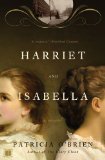Summary | Excerpt | Reading Guide | Reviews | Beyond the Book | Readalikes | Genres & Themes | Author Bio

Chapter One
Brooklyn Heights
March 7, 1887, 7:00 a.m.
A persistent skittering sound from the darkened space between
floor and baseboard pulls Isabella from an uneasy sleep. She sits up, shivering
in her thin cambric nightgown, scanning the room. The bed in which she lies, no
more than rusting scrap iron, creaks ominously as she hugs her knees to her
chest.
Her gaze travels from an old sideboard with broken drawer pulls
to the green curtains hanging like seaweed from the window, resting finally on a
scattering of black pellets that confirm the origin of the sound coming from the
floorboards.
Mice. She hates mice.
What is she doing here? She wonders if she is insane after all.
But the day has begun, and there's no use crouching in a ball
feeling sorry for herself, wishing only that she could drift back to sleep and
pick up the threads of her dream. She had been a child again, with Henry's large
hands gripping hers, swinging her by the arms, both of them laughing; she,
knowing he would not let go, knowing it was safe to throw her head back and not
worry that her feet were nowhere near the ground.
Fully awake now, Isabella presses her fists into her eyes to
stop sudden tears. At this moment a few houses away, Henry lies in his own bed,
cut down by a stroke. Everyone from President Cleveland to Queen Victoria is
keeping a death vigil for Henry Ward Beecher, for his eloquent preaching has
enthralled the country for decades. But she, his sister, uneasy occupant of a
garret room, is keeping vigil for the brother who played with her as a child,
the one who hasn't spoken to her in fifteen years.
"Why?" John Hooker's voice had been more exasperated than
astonished when she told him she was going to Brooklyn. His face had that
worried look which she had come to know so well through the long years of their
marriage. "You've got this vague idea that he wants to see you. If you show up
now, that family of yours will pull you apart. You're making a mistake."
"I want to see him before he dies. He's my brother; I love him."
"He's in a coma."
"He'll know I'm there."
"What is it you want, Bella? An apology?"
"I want...mutual forgiveness."
"You are fantasizing," John said somberly.
"I have to try," she said.
She knows the words ring hollow. Persuading Henry's wife to let
her see Henry will not be easy. Eunice does not forgive.
Isabella swings her feet to the floor, searching with her toes
for her slippers before padding to the window. People are gathering on the
sidewalk. There are some with heads bent, praying silently, probably Henry's
parishioners from Plymouth Church. But most are men milling about, talking in
low voices, stamping their feet to warm them on this frosty morning. They wear
bowler hats, cheap black ones, which mark them as reporters. Maybe it is the
angle of the hats -- jaunty, pushed back -- but she knows there is more going on
down there than a death watch. Those men are salivating for a meal long gone
cold. They want to revive what twelve years ago they dubbed the "trial of the
century." Henry's trial. They want it back in all its lurid detail: the
accusing, cuckolded Theodore Tilton raging for justice; his waiflike wife,
Elizabeth, alternately confessing and denying her guilt; Henry, insisting he, as
a man of God, would never commit adultery.
Twelve years now since the scandal that tore her family apart.
Twelve years since she and her brothers and sisters were said to wobble on their
national pedestal of moral virtue. The Beecher family, shaken by accusations of
Henry's human frailty -- that was the story reporters fed on, and it was true.
She knows the scandal still courses under the surface, emerging
from time to time in jokes and ditties sung on the streets and in the saloons.
And she knows that even though Henry continued to preach on Sundays from the
pulpit of Plymouth Church, his voice was never again quite as strong or his
demeanor quite as confident.
Copyright © 2008 by Patricia O'Brien.




A library is thought in cold storage
Click Here to find out who said this, as well as discovering other famous literary quotes!
Your guide toexceptional books
BookBrowse seeks out and recommends the best in contemporary fiction and nonfiction—books that not only engage and entertain but also deepen our understanding of ourselves and the world around us.